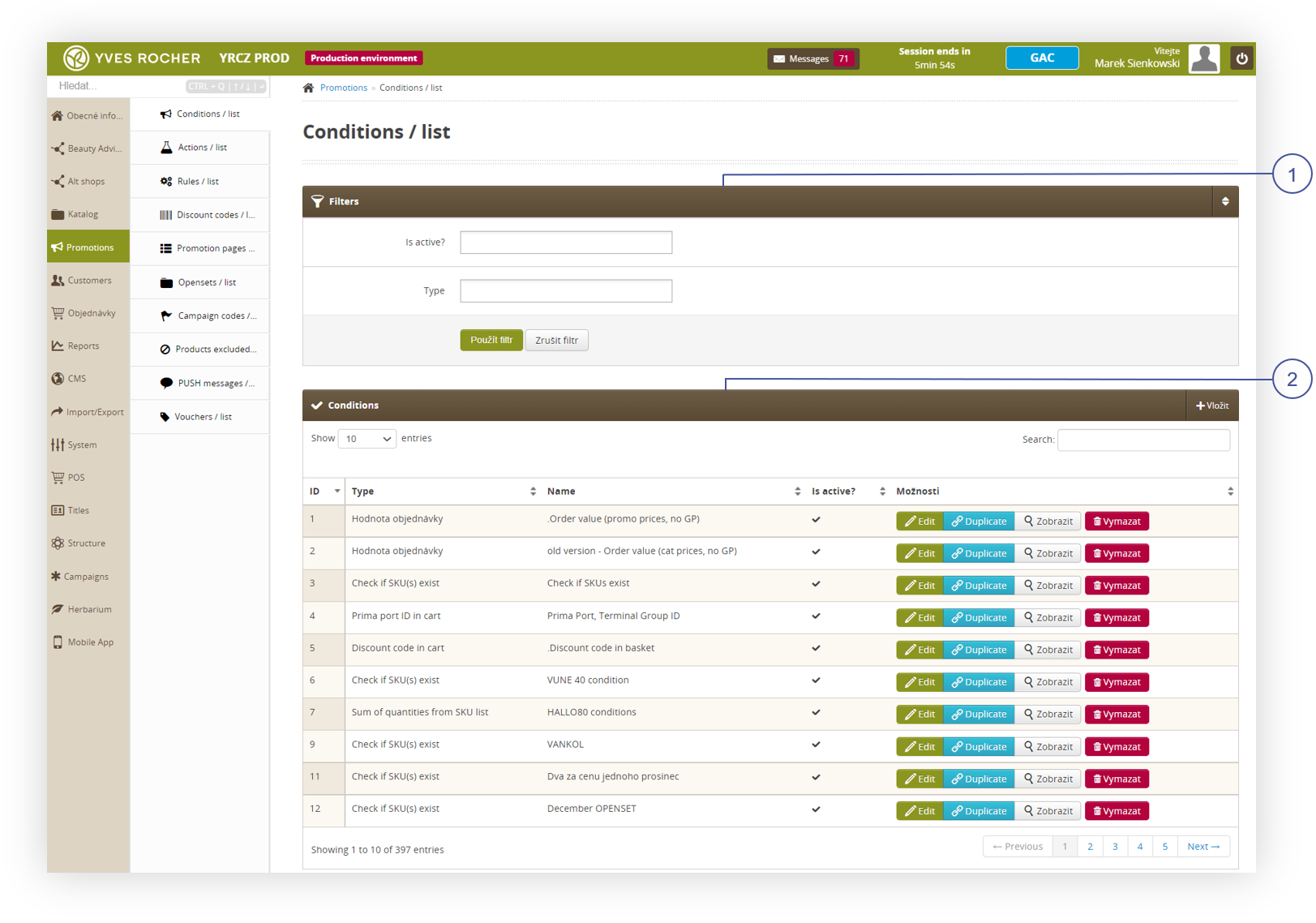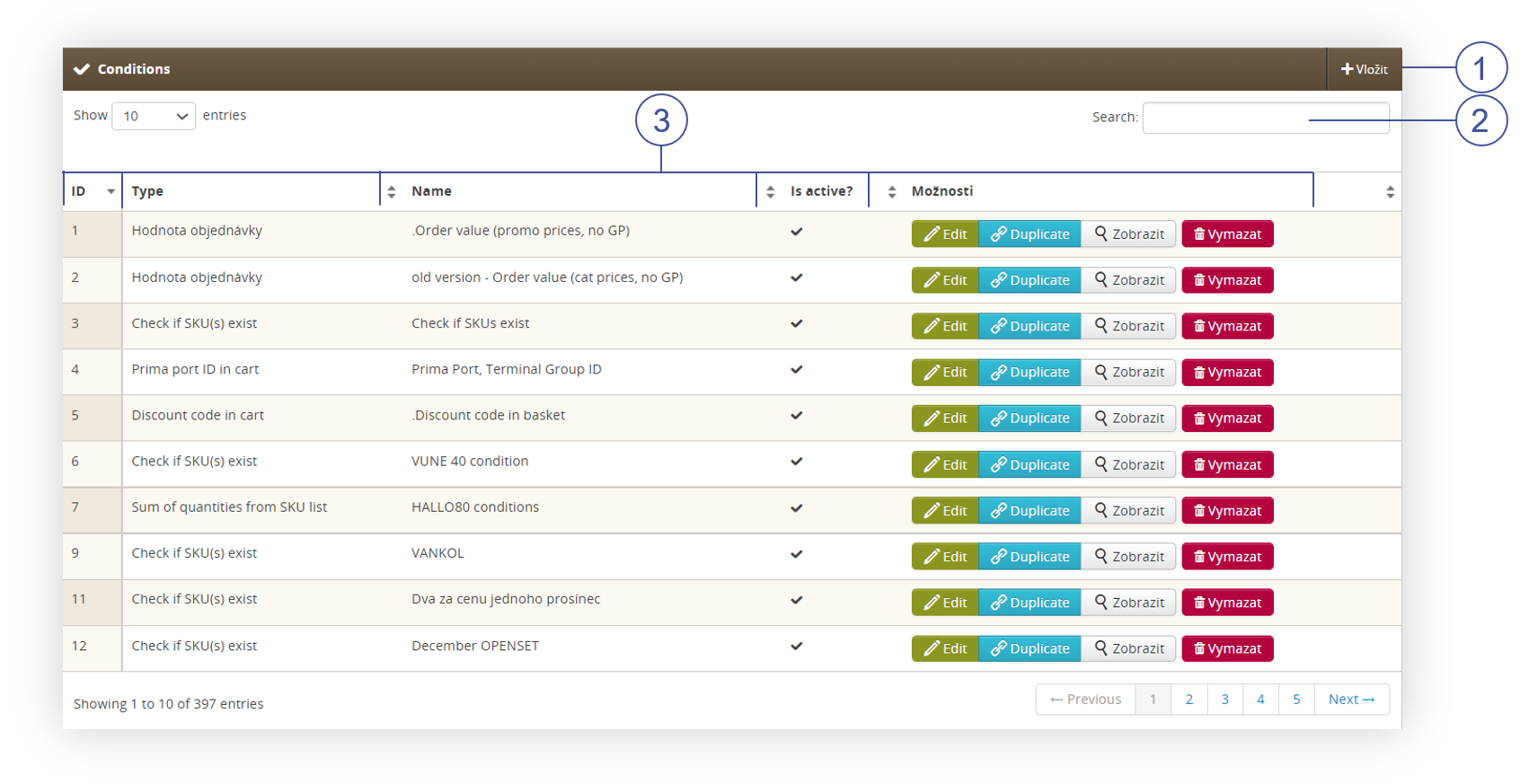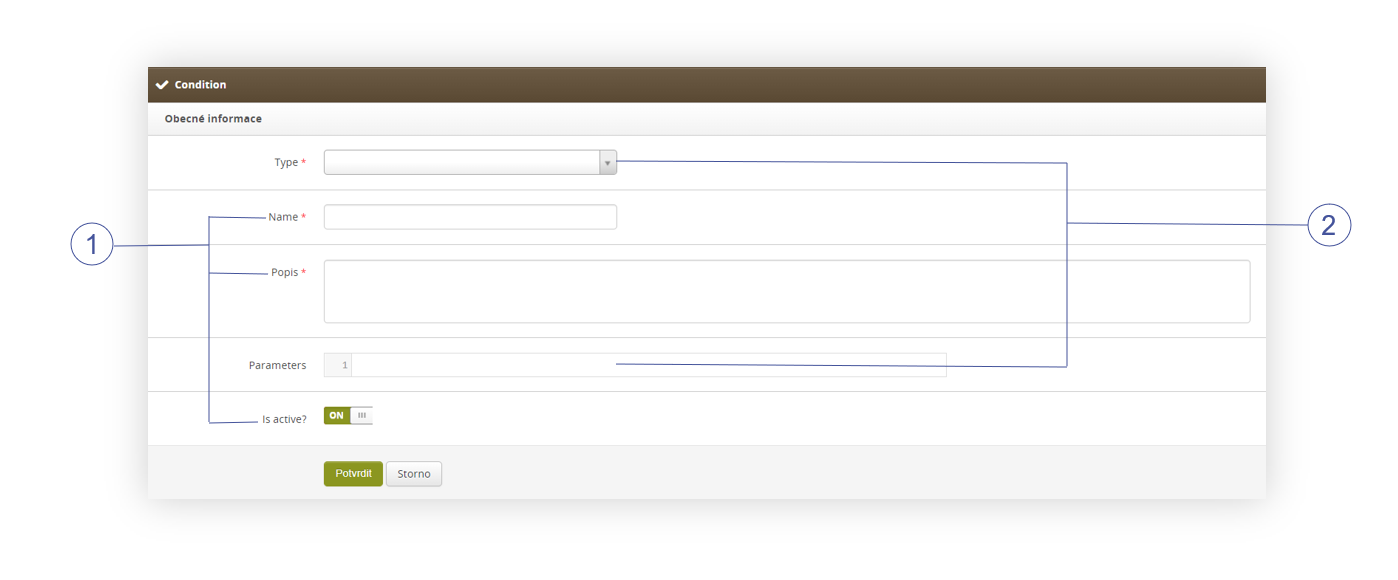Conditions
 Getting started
Getting started
This article will teach you about conditions, their types, and how to configure them. Conditions are used to determine whether a customer is eligible to get a promotion.
Conditions can be found in the
Promotions > Conditions / list
At the Conditions / list window Filters (1) can be found which will help search for a specific type of conditions, and the list of Conditions (2) itself, which allows for searching conditions by name, editing, deleting, and adding new ones.
 |
| Visualization of the Promotions, Conditions / list |
![]() RememberConditions and Actions are integral to Promotion Rules. All three can't be used individually. You can learn more about actions and rules in the Actions and Rules articles
RememberConditions and Actions are integral to Promotion Rules. All three can't be used individually. You can learn more about actions and rules in the Actions and Rules articles
Table of contents:
- Conditions / list
- Creating new condition
-
Condition types
- Discount code in cart
- Discount code is empty in cart
- Order value
- Check if SKU(s) exist
- Active alt shop
- Sum of quantities from SKU list
- Prima port ID in cart
- Count of orders
- Days from last order
- Voucher in cart
- Empty gift of choice in the cart
- Delivery method
- Payment method
- Customer title
- Regular account
- Order items count
- Promotion rules active in cart
 Conditions / list
Conditions / list
Filters
Filters are the first tab in Conditions / list. It is used to narrow the results in the Conditions list.
(1) Is active? - Shows only active or inactive conditions.
(2) Type - Shows only active or inactive conditions.
- Apply filters - Applies chosen filters to Conditions
- Clear filters - Clears chosen filters and refreshes Conditions
 |
| Visualization of Filters, Conditions / list |
Conditions
The conditions list is the main tab in this module. Here new conditions can be added (1), bellow there is a search field (2) that will filter out conditions names to typed letters. The table list itself (3) contains several columns, these are:
- ID - The number given after the creation of the condition, it cannot be changed. Used only for database listing.
- Type - Type of condition that determines its behavior (more about types in this section[LINK])
- Name - Name of the condition, used as the main identification. Its name is used for rules and in the search bar.
- Is active? - Mark that shows whether a condition is active or inactive
-
Actions - Four buttons:
- Edit - Edit condition, its name, description, whether it's active, and parameters.
- Duplicate - Duplicates condition with exact same parameters, the name will be edited by gaining (copy) as a suffix and changing its activation status to inactive.
- Show - Shows details of the condition without permission to edit.
- Delete - Erase condition, it won't be recoverable.
 |
| Visualization of Filters, Conditions / list |
 Creating new condition
Creating new condition
The condition has three fixed options that will stay the same (1), these are:
- Name - Name of the condition, used as the main identification. Its name is used for rules and in the search bar.
- Description - Description serves as an additional source of information about the condition and its mechanics
- Is active? - ON/OFF - switch to turn the condition active or inactive.
There are also two (2) configurable options that determine its behavior, these are:
-
Type - Determines the main target of verification. Types are:
- Discount code in cart (link do każdego, scrollujący do danego typu)
- Discount code is empty in cart
- Order value
- Check if SKU(s) exist
- Active alt shop
- Sum of quantities from SKU list
- Prima port ID in cart
- Count of orders
- Days from last order
- Voucher in the cart
- Empty gift of choice in the cart
- Delivery method
- Payment method
- Customer title
- Regular account
- Order items count
- Promotion rules active in cart
- Parameters - JSON code used for parametrization of the condition.
 |
| Visualization of Filters, Conditions / list |
![]() RememberJSON is a light-weighted format to exchange data. More about this format you can learn from here.
RememberJSON is a light-weighted format to exchange data. More about this format you can learn from here.
 Condition types
Condition types
The type of condition defines what it's supposed to look for when calculating cart items and values. Here are described all types of conditions and their parameters
Discount code in cart
This condition checks if there is a discount code in the cart (more about discount codes can be found in the Discount codes article).
- Parameters:
- None
- Logic operators:
- =
- !=
- Logic values:
- Discount code name
![]() Remember
Remember
Since this condition type is so general and lacks any parameters. There is usually one of this type in the environment.
Discount code is empty in cart
This condition checks if there isn't a discount code in the cart.
- Parameters:
- Discount code name - it is not used in the condition itself since adding this type of condition to the rule will require naming it.
- Logic operators:
- =
- !=
- Logic values:
- TRUE
- FALSE
![]() RememberSince this condition type is so general and lacks any parameters. There is usually one of this type in the environment.
RememberSince this condition type is so general and lacks any parameters. There is usually one of this type in the environment.
Order value
This condition checks the current cart value.
- Parameters:
-
prices:
- promotion - used by default, counts the value of products by promotion prices
- catalog - counts values of products by their standard prices
-
consider_discounts:
- FALSE - used by default, counts the value before all discounts
- TRUE - calculate order value after all discounts
-
use_default_excluded_list:
- TRUE - used by default, uses global excluded SKU list
- FALSE - excluded SKUs will also be counted toward the cart value
-
include_payed_gifts:
- TRUE - consider the value of payed gifts
- FALSE - used by default, do not count payed gifts
-
include_opensets:
- TRUE - opensets count into the cart value
- FALSE - used by default, do not count value of opensets
-
exclude_products:
- Array - SKU numbers, these will be excluded from the order value. This parameter is above and will exclude products regardless of use_default_excluded_list parameter.
-
exclude_fid_discounted_products:
- TRUE - Products discounted by the fidelity program will not be counted.
- FALSE - used by default, do not count value of products discounted by fidelity points
- Logic operators:
- =
- !=
- >
- <
- >=
- <=
- Logic values:
- Number - cart value
- Example:
- {"prices":"catalog","consider_discounts":"TRUE","exclude_products":["12345","54321"]}
Check if SKU(s) exist
This condition checks if the product SKUs from the selected array are present in the cart.
- Parameters:
-
SKU:
- Array - SKU numbers, without this parameter the condition won't work.
-
required_quantity:
- all - All SKUs from the SKU parameter have to be present in the cart
- number - Number of SKUs from the SKU parameter that has to be present.
-
consider_quantity:
- TRUE - The number of pieces counts towards the SKU parameter (for example if the SKU parameter has 3 SKU's in the list then one of these SKU's added 3 times to the cart will return TRUE value in the promotion rule)
- FALSE - Used by default, doesn't count the number of pieces
- Logic operators:
- =
- !=
- Logic values:
- TRUE
- FALSE
- Example:
- {"SKU":["12345","54321"],"required_quantity":"5"}
Active alt shop
This condition checks the altshop. This type is deprecated and unused. Promotion rules already are able to filter altshops.
Sum of quantities from SKU list
This type sums up all pieces from the SKU list set in the parameters.
- Parameters:
-
SKU:
- Array - SKU numbers, without this parameter the condition won't work.
- Logic operators:
- =
- !=
- >
- <
- >=
- <=
- Logic values:
- Number - Quantity of products
- Example:
- {"SKU":["54321","12345"]}
Prima port ID in cart
This type of condition is no longer supported since Prima port is no longer used.
Count of orders
This type count the number of orders in the customer account.
- Parameters:
-
orders:
- all - All orders from the customer account will be counted (still regulated by the rest of the parameters)
- all_mc - All orders are counted but since the date of gaining a title. You can learn more about customer titles in the Campaigns and titles article.
- current_title - Orders are counted since the date of gaining the current customer title.
- active_rule - Orders are counted only if they used certain promotion rules (list from parameter rule id)
-
campaigns:
- Array - List of campaigns short names (more about campaigns in this article [UNDER CONSTRUCTION]
-
date_from:
- date - The format for the date is YYYY-MM-DD (for example 2018-12-31). Orders will be counted from this date onwards.
-
date_to:
- date - The format for the date is YYYY-MM-DD (for example 2018-12-31). Counted will be orders placed only before this date.
-
titles:
- Array - List of title short names. Orders will be counted only if they were placed while the customer had these titles. Only used when parameter "orders":"current_title"
-
rule_id:
- Array - List of Rules id's. This parameter only works with "orders":"active_rule"
-
only_paid:
- TRUE - Only COD or fully paid orders are counted.
- FALSE - Orders with pending payment are also counted
-
altshop_id:
- id of altshop only from which orders are considered. The parameter value can only be one altshop/one ID. You can't use an array of altshop ID's.
Syntax example: - {"altshop_id":"122"}
- id of altshop only from which orders are considered. The parameter value can only be one altshop/one ID. You can't use an array of altshop ID's.
- Logic operators:
- =
- !=
- >
- <
- >=
- <=
- Logic values:
- Number - Orders
- Example:
- {"orders":"all_mc","campaigns":["Campaign1","Campaign2"],"date_from":"2023-01-12","date_to":"2023-02-22"}
Days from last order
This condition count passed days from the last order.
- Parameters:
-
orders:
- all - All orders from the customer account will be counted (still regulated by the rest of the parameters)
- all_mc - All orders are counted but since the date of gaining a title. You can learn more about customer titles in the Campaigns and titles article.
- current_title - Orders are counted since the date of gaining the current customer title.
- active_rule - Orders are counted only if they used certain promotion rules (list from parameter rule id)
-
campaigns:
- Array - List of campaigns short names (more about campaigns in this article [UNDER CONSTRUCTION]
-
date_from:
- date - The format for the date is YYYY-MM-DD (for example 2018-12-31). Orders will be counted from this date onwards.
-
date_to:
- date - The format for the date is YYYY-MM-DD (for example 2018-12-31). Counted will be orders placed only before this date.
- Logic operators:
- =
- !=
- >
- <
- >=
- <=
- Logic values:
- Number - Orders
- Example:
- {"orders":"all_mc","campaigns":["Campaign1","Campaign2"],"date_from":"2023-01-12","date_to":"2023-02-22"}
![]() Warning If there are no order-matching rules defined by parameters, the condition will return 999 days. We strongly recommend pairing this condition with "Count of closed orders > 0"
Warning If there are no order-matching rules defined by parameters, the condition will return 999 days. We strongly recommend pairing this condition with "Count of closed orders > 0"
Voucher in the cart
This condition verifies whether there is applied promotion code in the cart.
- Parameters:
-
type:
- 1 - Fiden2 code, this type is set as default.
- 2 - Promotion code from Promotions > Discount codes / list. You can learn more about discount codes in the Discount codes article.
- Logic operators:
- =
- !=
- Logic values:
- TRUE
- FALSE
- Example:
- {"type":"2"}
Empty gift of choice in cart
This condition will check if the customer chooses a certain, empty gift from the Gift of choice action type. You can learn more about actions in the Actions article.
- Parameters:
-
rule_id:
- 1 - Fiden2 code, this type is set as default.
- 2 - Promotion code from Promotions > Discount codes / list (More about codes in this article[UNDER CONSTRUCTION])
- Logic operators:
- =
- !=
- Logic values:
- TRUE
- FALSE
- Example:
- {"rule_id":"2"}
Delivery method
This type checks chosen delivery method.
- Parameters:
-
name:
- Array - List of delivery method names.
- Logic operators:
- =
- !=
- Logic values:
- TRUE
- FALSE
- Example:
- {"name":["Delivery1","Delivery2"]}
Payment method
This type checks chosen payment method.
- Parameters:
-
name:
- Array - List of delivery method names.
- Logic operators:
- =
- !=
- Logic values:
- TRUE
- FALSE
- Example:
- {"name":["Payment1","Payment2"]}
Customer title
This type checks current customer title.
- Parameters:
-
include_title:
- Array - List of shortcut title names that will count into the TRUE value during calculation.
-
exclude_title:
- Array - List of shortcut title names that will count into the FALSE value during calculation.
- Logic operators:
- =
- !=
- Logic values:
- TRUE
- FALSE
- Example:
- {"include_title":["T0","TS"]}
Regular account
This type checks if a customer is logged in to a registered account (not one-time).
- Parameters:
- None
- Logic operators:
- =
- !=
- Logic values:
- TRUE
- FALSE
Orders item count
This type checks the number of items in the cart.
- Parameters:
-
consider_quantity:
- TRUE - Set by default, every piece in each row will be counted.
- FALSE - Only unique SKUs will be counted.
-
consider_gifts:
- TRUE - Gifts will be counted to this condition.
- FALSE - Set by default, gifts won't be counted to this condition.
-
consider_sets:
- TRUE - All sets will be counted.
- FALSE - Set by default, sets won't be counted.
-
consider_outlet:
- TRUE - Discounted products with the flag outlet will count toward this condition.
- FALSE - Set by default, products with the flag outlet won't be counted.
-
consider_greenpoint:
- TRUE - Products with the flag greenpoint will count toward this condition.
- FALSE - Set by default, products with the flag greenpoint won't be counted.
- Logic operators:
- =
- !=
- >
- <
- >=
- <=
- Logic values:
- Number - Products in a cart
- Example:
- {"consider_quantity":"FALSE","consider_greenpoint":"TRUE"}
Promotion rules active in cart
This type checks if a set of rules is active in a cart. A rule is considered an active one when its conditions are met. A rule with no conditions is always considered as active. It is important to remember to set a sort order in a rule with this condition to a high value, so it is read last by the promotion module.
- Parameters:
-
rule_ids:
- Array- list of rules' IDs that are checked for activity. Set by default, every piece in each row will be counted.
-
mode (Default "all"):
- "all" means all of the rules must be active,
- "any" means any of the rules must be active.
- Logic operators:
- =
- !=
- Logic values:
- TRUE
- FALSE
- Examples:
-
Rule 123 is active:
- {"rule_ids": [123]}
-
All the rules 123 and 321 are active:
- {"rule_ids": [123, 321]}
-
Any of the rules 123 and 321 is active:
- {"rule_ids": [123, 321], "mode": "any"]}
